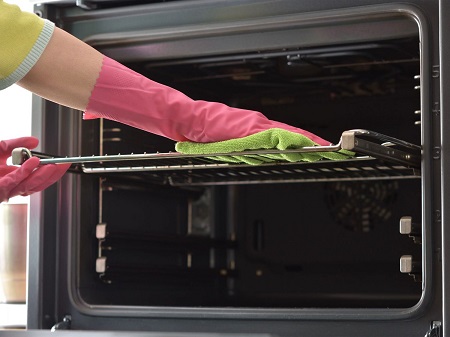Understanding the Importance of Oven Cleaning
Oven cleaning is an essential part of kitchen maintenance that often gets overlooked. Many homeowners use their ovens daily but neglect to clean them regularly, which can lead to a buildup of grease, food residue, and carbon deposits. Over time, these contaminants not only affect cooking performance but also shorten the lifespan of the appliance. By maintaining a clean oven, you ensure that it operates efficiently, lasts longer, and remains safe to use.
How Oven Cleaning Enhances Performance
A clean oven works more efficiently than a dirty one. When grease and food debris accumulate, they can interfere with heat distribution, leading to uneven cooking. This means food may take longer to cook or may not cook properly, causing frustration in the kitchen. Regular oven cleaning removes these obstructions, allowing heat to circulate freely and ensuring that food is cooked evenly and thoroughly.
Preventing Mechanical Failures
One of the main reasons ovens fail prematurely is due to a lack of maintenance. When grease and debris accumulate, they can clog important components such as heating elements, fans, and vents. This puts extra strain on the appliance, leading to overheating and potential breakdowns. Regular oven cleaning helps prevent these issues, reducing the likelihood of costly repairs or replacements.
Avoiding Fire Hazards
A dirty oven is a fire hazard waiting to happen. When grease and food particles build up, they can ignite at high temperatures, posing a serious risk to your home and safety. Routine oven cleaning minimizes this danger by removing flammable substances, making your kitchen a safer environment for cooking.
Eliminating Unpleasant Odors
Have you ever noticed a burnt smell when using your oven? This is often caused by leftover food residue burning when the oven is in use. These odors can affect the taste of freshly cooked meals and create an unpleasant atmosphere in your kitchen. Regular oven cleaning eliminates these lingering smells, ensuring that your food tastes exactly as it should.
Reducing Energy Consumption
A dirty oven requires more energy to reach and maintain the desired temperature. When heat is obstructed by grease and grime, the appliance must work harder to compensate, leading to increased energy usage. By keeping your oven clean, you allow it to operate efficiently, reducing energy consumption and lowering your utility bills.
Common Misconceptions About Oven Cleaning
Myth: Self-Cleaning Ovens Don’t Need Additional Cleaning
Many people assume that self-cleaning ovens eliminate the need for manual cleaning. While self-cleaning functions help remove some residues, they do not completely replace the need for regular maintenance. High temperatures may not effectively eliminate all grease and burnt food, so occasional manual oven cleaning is still necessary.
Myth: Oven Cleaning Is Only for Aesthetic Purposes
Some believe that oven cleaning is purely cosmetic, but the reality is that a clean oven contributes to better cooking performance, improved safety, and enhanced appliance longevity. Beyond making the oven look better, routine maintenance is crucial for functionality and efficiency.
Myth: Harsh Chemicals Are Necessary for Effective Cleaning
Many commercial oven cleaners contain harsh chemicals that can be hazardous to your health. Fortunately, natural alternatives such as baking soda, vinegar, and lemon juice can effectively clean an oven without exposing you to toxic fumes. These eco-friendly solutions are safe and just as effective as store-bought products.
Tips for Effective Oven Cleaning
Use Natural Cleaning Methods
Instead of relying on chemical cleaners, consider using baking soda and vinegar. This combination breaks down grease and grime without damaging the oven’s interior.
Clean Spills Immediately
One of the easiest ways to keep your oven clean is to wipe up spills as soon as they occur. This prevents food from burning onto the surface and becoming difficult to remove.
Schedule Regular Deep Cleans
Even with routine maintenance, a deep clean every few months is essential. Remove racks, scrub surfaces thoroughly, and ensure that all components are free from grease and debris.
Protect the Oven with Liners
Oven liners can help catch drips and spills, making cleaning easier. These liners can be removed and washed, preventing buildup inside the oven.
The Long-Term Benefits of Regular Oven Cleaning
Increased Appliance Longevity
With proper maintenance, an oven can last well beyond its expected lifespan. Regular cleaning prevents wear and tear, reducing the likelihood of expensive repairs or replacements.
Better Cooking Experience
A clean oven provides consistent heat distribution, leading to better cooking results. No more worrying about unevenly cooked meals or lingering burnt smells affecting your food.
Improved Hygiene and Health
A dirty oven can harbor bacteria and mold, contaminating your food and impacting your health. Keeping your oven clean reduces these risks, ensuring a hygienic cooking environment.
Final Thoughts
Oven cleaning is not just about aesthetics—it plays a crucial role in maintaining appliance performance, safety, and longevity. By incorporating regular cleaning into your routine, you ensure that your oven remains in top condition for years to come. Whether you opt for professional services or DIY methods, prioritizing oven cleaning will save you time, money, and potential safety hazards in the long run.





Comments